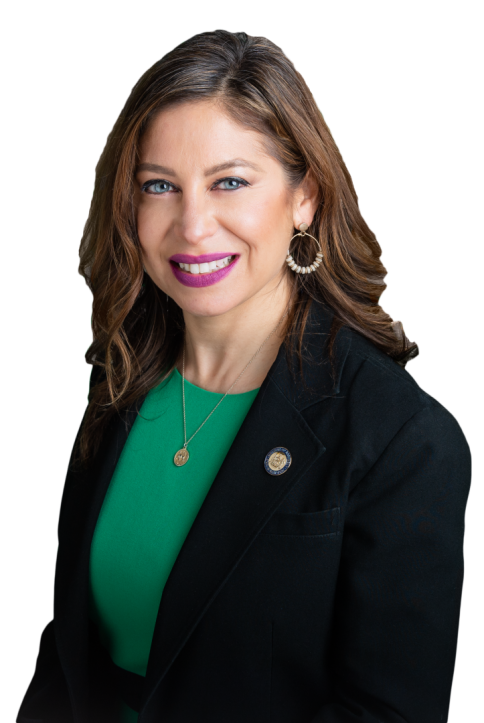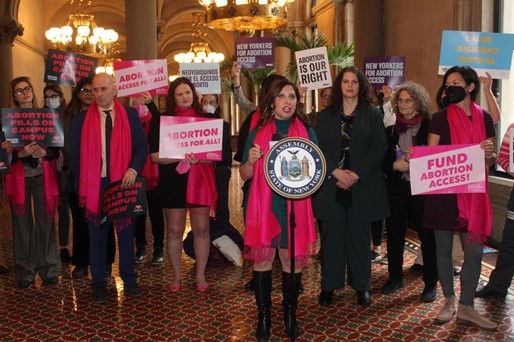On the Heels of the 50th Anniversary of Roe v. Wade, Assemblymember Jessica González-Rojas and Assembly and Senate Colleagues Call for the Passage of the Reproductive Freedom and Equity Act
ALBANY, NY– On Tuesday afternoon, Assemblymember González-Rojas held a press conference outside of the Senate Chambers to call on the Assembly to pass, and the Governor to sign, A00361 (González-Rojas), the Reproductive Freedom and Equity Act (RFEA). The Senate is expected to pass the Senate version of the bill, S348B (Cleare) later today.
The RFEA would establish a new fund that would enable the New York State Department of Health to issue grants to abortion providers and non-profit organizations that facilitate access to abortion care. Specifically, these grants would help aid provider capacity building, fund uncompensated care for those who lack coverage, and support the practical support needs of individuals facing barriers to abortion care.
Many New Yorkers live in abortion deserts where they cannot access the care they need. In 2017, 39% of New York counties had no clinics that provide abortions, according to the Guttmacher Institute. New Yorkers often have to travel hours from one part of the state to another in order to get abortion care. In addition, since the Supreme Court overturned Roe v. Wade in June with its opinion in the Dobbs v. Jackson Women’s Health Organization (Dobbs), New York has also experienced a marked rise in the number of people seeking abortion care here. According to the New York Abortion Access Fund (NYAAF), case managers supported 17% more people from out-of-state who needed to access abortion care in the months following Dobbs than usual. In total, since the end of June 2022, NYAAF has received calls for support from people seeking abortion care from five countries and twenty-six different states. The Reproductive Freedom and Equity Act would protect vulnerable people seeking access to safe abortion care and provide adequate, sustainable funding to providers and non-profit organizations that facilitate abortions.
State Attorney General Letitia James and Senate Majority Leader Chuck Schumer publicly supported the RFEA when it was first introduced last session.
Attendees at the press conference also called on both houses to pass a bill that would require SUNY and CUNY campuses to provide medication abortion services, and for the Governor to sign the bill into law. Governor Hochul recently announced support for this bill in her State of the State. The bill is sponsored by Assemblymember Harvey Epstein and Senator Cordell Cleare.
“One of our greatest fears for generations came true in June when the Supreme Court overturned Roe v. Wade. New York must continue to be a leader at this moment and meet the ongoing demand for abortion care here. That is why I’m proud to have re-introduced the Reproductive Freedom and Equity Act this session, which will allow providers and non-profit organizations that facilitate abortion care to have access to adequate funding each year to do their invaluable work. I’m thrilled that the Senate has passed its version of the bill today, and I urge my colleagues in the Assembly to take it up as soon as possible. This fund will ensure that New York is a safe access state for years to come,” said Assemblymember Jessica González-Rojas.
“I am extraordinarily proud that today we once again demonstrate that effective, compassionate reproductive health care is an inviolable human right!With the passage of the Reproductive Freedom and Equity Program, we ensure that New York will continue to be a beacon and haven for all those who need empowering access to healthcare procedures that are now banned in eighteen states.Forthwith, we must make certain that this same level of care is provided on College Campuses by swiftly enacting S.1213 and making sure that both programs are fully funded every year,” said Senator Cordell Cleare.
“In the wake of the Supreme Court’s decision in June to overturn Roe v. Wade, we have welcomed increasing numbers of people seeking abortion care here in New York,” said Senator Lea Webb, Chair of Women's Issues. “Today, we took an important step toward making sure that the NYS Department of Health can issue grant funding to abortion providers and non-profit organizations. The Reproductive Freedom and Equity Act (RFEA) will remove barriers to abortion care for those who need it most by ensuring that providers can build capacity and provide uncompensated care for those who lack coverage.”
Senator Samra Brouk said: “New York has long been a leader in making safe, quality reproductive care accessible for all people who need it. Now, in the wake of a radical Supreme Court’s efforts to erode our rights, we must expand access to care to those who need it. The Reproductive Equity & Freedom Act will ensure that those providing this lifesaving care have the resources they need to meet the growing demand for reproductive care in New York.”
“Between my legislation to provide medication abortion at public university health centers and the Reproductive Freedom and Equity Act, we’re fighting back in an increasingly hostile environment for civil rights to guarantee not only the right to abortion but access to it. Already we are seeing an increase in people traveling from restrictive states to seek abortion care in New York. We have a responsibility as an abortion access state to support patients whether they’re studying in our public universities or traveling from out of state. Abortion is healthcare and healthcare is a human right,” said Assemblymember Harvey Epstein.
"As New York sees a vast increase in out-of-state abortion patients, the reality on the ground is bleak – wait times are increasing, our abortion funds are experiencing unprecedented demand, and anti-abortion protesters only grow bolder. As a student organizer and abortion doula, I've seen firsthand the impact this has had on young people across the state. Providing on-campus medication abortion increases points of access to reproductive care and reduces the demand on our clinics. For students, it makes insurance coverage easier, reduces precious travel time, and can help to increase awareness about our options. Further, the Reproductive Freedom and Equity Act helps our clinics and funds do the needed direct support work and bridges the gap between New York being a 'legal' state for abortion and being one that is truly accessible and strives towards reproductive justice. I'm proud to stand alongside representatives supporting the work of and listening to organizers and activists," said Niharika Rao, from Reproductive Justice Collective NY, Advocates for Youth, and NYC for Abortion Rights.
Andrea Miller, President of the National Institute for Reproductive Health and NIRH Action Fund said: “The New York Reproductive Freedom and Equity Fund and the Medication Abortion on College Campuses bills are critical measures that will help make the right to make reproductive decisions a reality, especially for those who often face insurmountable financial and logistical barriers to abortion care. The equity fund will build on the Reproductive Health Act we passed together in 2019 to protect abortion rights by creating a pathway to meaningful access. Covering medical, travel, and other costs for people seeking abortion care while investing in our reproductive health infrastructure will ensure that a person’s income and zip code do not have to push abortion out of reach. Increased access to medication abortion on college campuses helps support students’ bodily autonomy and their overall quality of life. Bills like these are a gold standard we hope to see win the day in New York and across other state legislatures.”
“At this moment, New York must comprehensively fund abortion care. Five decades ago, and three years before the Court decided Roe, New York first opened its doors to people from across the U.S. who needed abortion care. In addition to passing the Equality Amendment to build meaningful constitutional protections, Albany lawmakers must break down financial barriers to care by passing the Reproductive Freedom and Equity Act. This critical legislation would help abortion providers increase access to care, fund uncompensated care, and ensure money is not an obstacle for individuals seeking an abortion by funding abortion funds and logistical support funds – the organizations that make care a reality for people with financial need,” said Donna Lieberman, Executive Director of the New York Civil Liberties Union.
"Our right to self-determine our own lives continues to be the fight generations of people, especially Black girls and women, take on year after year. The idea of bodily autonomy means we have the ability to choose the care we need when we need it and where we feel most comfortable receiving it. However, that is not achievable without the right, sustainable investments in the communities that experience the most barriers to Reproductive Health Care. The Reproductive Freedom and Equity Act is a comprehensive solution that cements New York’s status as an access state because it is expansive in ways that creates a safety net and closes the gaps for our most marginalized communities, especially young people. There is no true Reproductive Justice without the inclusion of young people. There is no Reproductive Justice without Black women and girls," said Quadira Coles, Director of Policy at Girls for Gender Equity
“Fifty years ago, Roe v. Wade gave us the right to abortion in the U.S., but it never actually made abortion care accessible for Latinas/xs and other communities of color. Abortion has been largely out of reach for our communities as out-of-touch politicians have been working for decades to erect barriers to care, including forcing people to travel long distances for care. Nearly 6.5 million Latinas – 42 percent of all Latinas ages 15-49 – live in the 26 states that have banned or are likely to ban abortion. They represent the largest group of women of color impacted by current or likely state bans. At the same time, New York’s abortion providers are already struggling with limited capacity to provide care to all who need it.New York currently has no ongoing, dedicated systemic investment in abortion care. There is a lack of sustained funding for workforce training and development and no funds to address uncompensated care or support the logistical needs of low-income abortion patients. This is why we must pass The Reproductive Freedom & Equity Fund [A361 / S348B] which will ensure that state funding will continue to be a reliable source of support in the years ahead for abortion access. New Yorkers and the nation are counting on us to lead the fight for reproductive justice, now is the time for us to take bold action,” said Elizabeth Estrada, New York Field and Advocacy Manager, National Latina Institute for Reproductive Justice.
"Access for abortion care in New York, and across the country, has never been more vital. As we mark what would’ve been the 50th anniversary of Roe v. Wade, we’re called to action to build something greater than Roe. The Reproductive Freedom and Equity Program is a needed and bold investment in abortion access that embodies that vision and moves New York towards a more equitable future. We applaud Assemblymember González-Rojas and Senator Cleare for their leadership in the creation of this critical program, which will bolster New York’s ability to meet the needs of patients seeking abortion care by funding investments in providers and abortion funds, that will strengthen and expand access to care – because the right to abortion is a hollow promise if one cannot access it,” said Georgana Hanson, interim President and CEO, Planned Parenthood Empire State Acts.

